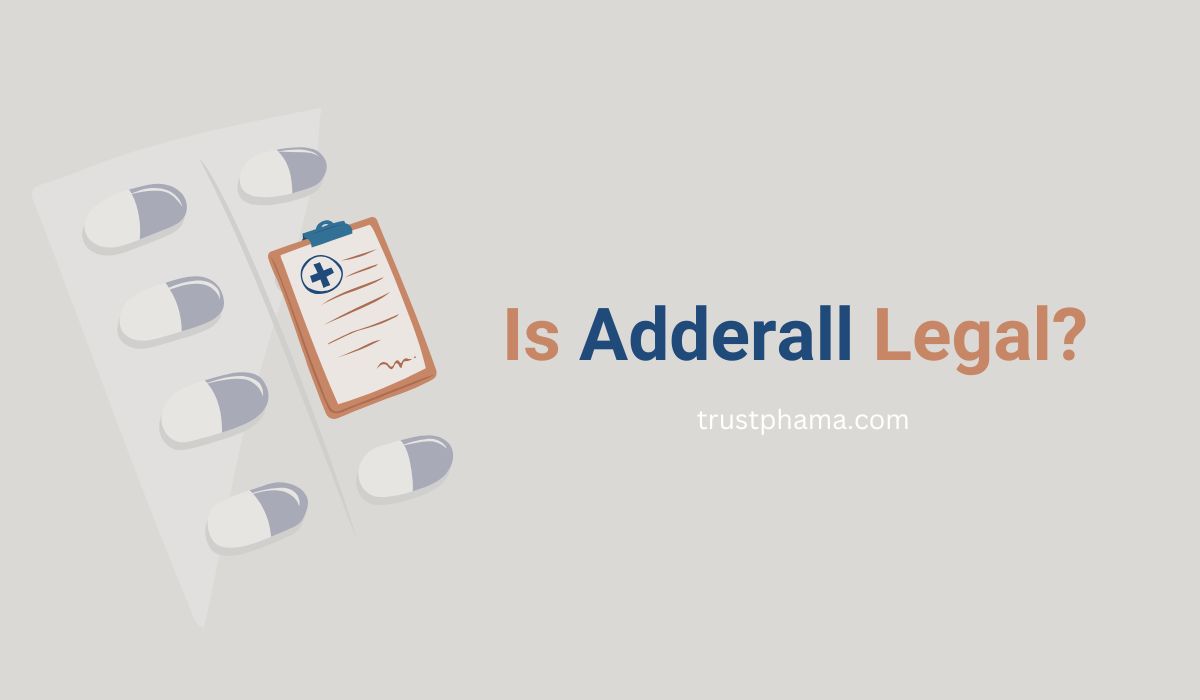Adderall, a prescription medication containing amphetamine and dextroamphetamine, is commonly used to treat attention deficit hyperactivity disorder (ADHD) and narcolepsy. While it is highly effective for these conditions, its legal status and classification as a controlled substance make its use and distribution strictly regulated.
In this article, we’ll explore the legality of Adderall, its status as a controlled substance, and the reasons for its regulation.
Is Adderall Legal?
Yes, Adderall is legal, but only under specific conditions. It is a prescription medication that must be prescribed by a licensed healthcare provider. Its use is restricted to individuals diagnosed with ADHD or narcolepsy, and it is only legal to possess or use Adderall if it has been prescribed to you. how long does adderall stay in your system?
Key Points About Adderall’s Legality:
- Prescription Requirement: You cannot legally purchase, possess, or use Adderall without a prescription.
- Off-Label Use: Using Adderall for purposes other than those prescribed, such as enhancing focus or performance without a medical diagnosis, is illegal.
- International Restrictions: Adderall’s legality varies by country. For example:
- In the United States, Adderall is legal with a prescription but is a Schedule II controlled substance (more on this below).
- In the United Kingdom, Adderall is banned, and its use is not permitted, even with a prescription, due to its classification as a prohibited substance.
- In many other countries, strict regulations govern its use, requiring a prescription and medical oversight.
Is Adderall a Controlled Substance?
Yes, Adderall is classified as a Schedule II controlled substance under the U.S. Controlled Substances Act (CSA). This means it has recognized medical uses but also carries a high potential for abuse and dependence.
Why is Adderall Controlled?
- Risk of Abuse:
- Adderall can produce feelings of euphoria, increased energy, and enhanced focus, making it a target for misuse.
- It is sometimes used recreationally or as a “study drug” by individuals without a prescription, which can lead to addiction.
- Potential for Addiction:
- Adderall stimulates the central nervous system, which can create a dependency if misused.
- Long-term or improper use can result in tolerance, requiring higher doses to achieve the same effects, increasing the risk of addiction.
- Serious Side Effects:
- Misuse of Adderall can lead to side effects such as increased heart rate, high blood pressure, anxiety, paranoia, or, in severe cases, heart attack or stroke.
Other Schedule II Drugs:
Other substances in the Schedule II category include oxycodone, fentanyl, methamphetamine, and cocaine. These substances share the common characteristic of having medical uses while being tightly regulated due to their abuse potential.
Legal Consequences of Misusing Adderall
The consequences of possessing, distributing, or using Adderall without a prescription can be severe:
- Possession Without Prescription:
- Being caught with Adderall without a valid prescription can result in fines, criminal charges, or jail time, depending on the quantity and intent.
- Sharing or Selling:
- Distributing Adderall to someone without a prescription is a federal offense in many countries, including the U.S.
- International Travel:
- Carrying Adderall across borders without declaring it can result in legal trouble, especially in countries where Adderall is banned or heavily restricted.
How to Use Adderall Safely
To ensure the safe and legal use of Adderall:
- Follow Prescriptions:
- Only take Adderall as prescribed by a licensed healthcare provider. Do not share your medication with others.
- Monitor Side Effects:
- Report any adverse effects, such as changes in mood, heart rate, or sleep patterns, to your doctor immediately.
- Store Securely:
- Keep Adderall in a safe place to prevent misuse or theft.
- Avoid Mixing Substances:
- Do not combine Adderall with alcohol or other substances, as this can increase the risk of harmful interactions.
Why is Adderall Banned in Some Countries?
In some countries, including the UK, Adderall is banned due to its high potential for misuse and dependency. While alternative medications are available to treat ADHD and narcolepsy, the risks associated with Adderall’s stimulant properties outweigh its benefits in these regions.
Conclusion
Adderall is a legal and effective medication for ADHD and narcolepsy when used as prescribed by a healthcare professional. However, its status as a controlled substance highlights the importance of strict regulation to prevent misuse, addiction, and health risks.
Buy Adderall Online, use it responsibly, follow your doctor’s guidance, and never share it with others. For those considering its use, consult a medical professional to understand its benefits, risks, and legal implications in your country. Always prioritize safety and legality when managing your health conditions.
